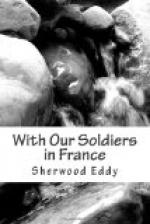We may turn to “A Student in Arms” for his interpretation of the feeling of the common soldier in this crisis:
“Then at last we ‘got out.’ We were confronted with dearth, danger, and death. . . . They, who had formerly been our despair, were now our glory. Their spirits effervesced. Their wit sparkled. Hunger and thirst could not depress them. Rain could not damp them. Cold could not chill them. Every hardship became a joke. . . . Never was such a triumph of spirit over matter. . . . If it was another fellow that was hit, it was an occasion for tenderness and grief. But if one of them was hit, O Death, where is thy sting? O Grave, where is thy victory? . . . Life? They did not value life! They had never been able to make much of a fist of it. But if they lived amiss they died gloriously, with a smile for the pain and the dread of it. What else had they been born for? It was their chance. With a gay heart they gave their greatest gift, and with a smile to think that after all they had anything to give which was of value. One by one Death challenged them. One by one they smiled in his grim visage, and refused to be dismayed. They had been lost, but they had found the path that led them home; and when at last they laid their lives at the feet of the Good Shepherd, what could they do but smile?”
It has been well said that there is much natural religion in the trenches, but that much of this religion is not Christian. What is the attitude of the men to Christ Himself? Most of them associate Him with all that is highest and noblest in life. They link Him with God in their thought, and with themselves in their time of deepest need. Although His name with that of God is sometimes taken on their lips in profanity, there is often a deep reverence for Him. Thousands have seen the cross of Christ standing among the ruins in the villages of Belgium and Northern France, when all about seems to be battered and wrecked. The old skeptical theories and captious criticisms of pre-war days are little heard during this awful time. Generally speaking, the facts of the gospel narrative are not disputed. They believe in Christ as the revelation of God. They have no difficulty with the doctrine of the divinity of Christ and do not doubt that He is a living reality and has power to save. Their only difficulty is with their own sin. They do not know how to break from it or are unwilling to give it up.
The great need of the hour is for interpretation. On the one hand, men have had in their hours of great need a deep experience of God which they do not understand; yet on the other hand, they are gripped by the power of temptation which alone they cannot overcome. They admire the virtues of courage, generosity, and purity, but for the most part they see no connection between these and the presentation of Christ in the lives and words of those about them who profess to be Christians. What is needed is personally to relate the man to the God and Father of Jesus Christ, with Whom he has been brought face to face at the battle front. There is urgent and imperative need of the giving of that message, both in public presentation and in the channels of personal friendship.




